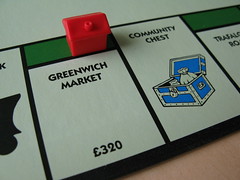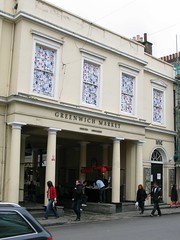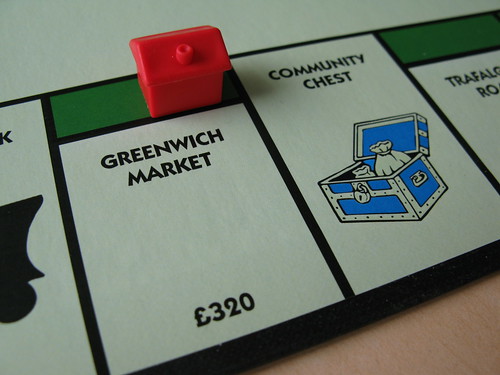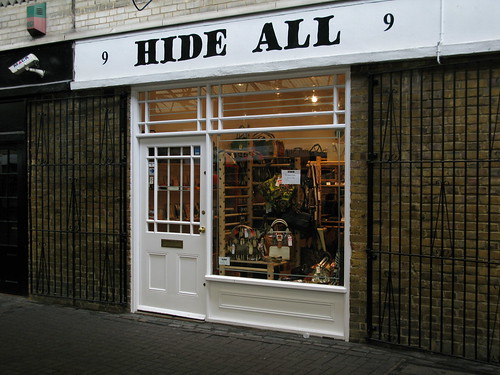GREENWICH Hospital may be running into financial difficulties with its controversial plan to redevelop Greenwich Market, a leaked email shows.
The email, obtained by greenwich.co.uk, shows that the Hospital’s property consultant, Gleeds, is appealing for “grant funding” from Greenwich Council to help it complete the £29 million “regeneration.”
Greenwich Hospital confirmed to us that it has also approached the Heritage Lottery Fund for help with funding the redevelopment.
Its spokesman, David McFarlane, insisted that the approaches were for funding “at the margins” and “the whole project team is working on the assumption that we can fund [the redevelopment] from our own resources.”
However, Martin Sands, the Hospital’s director, does say in the charity’s latest annual accounts that the Hospital suffered a drop in the value of its assets of £6.5 million last year “as a result of a sharp decrease in the stock markets.” Its quoted investments declined by more than 13% over the year.
Those accounts only cover the period to March 2008, since when there has been a far more dramatic collapse in the values of shares and property – likely to have taken the Hospital’s losses to far greater levels.
The impact of the credit crunch appears to have been one reason why the Hospital’s planning application for the Market site – originally expected in “autumn 2008,” according to the annual report – has been delayed until now.
Mr McFarlane told greenwich.co.uk in autumn 2008 that the scheme was being reworked “to keep the cost base down.” As a result of the reworking, the most revenue-generating aspects of the scheme have been increased – such as the “boutique” hotel, now increased in size by 73 per cent on the original proposal, from 60 to 104 rooms.
However, the latest email shows that with the crisis in commercial property showing no signs of easing, the reworking may not have been enough.
The email was written on Monday this week by Tonderayi Matopodzi at Gleeds, the property consultants used by the Hospital, and is to Mervyn Fernandes, an officer at Greenwich Council.
It says: “We are currently exploring whether any potential grant funding may be available through Greenwich Council for our client, Greenwich Hospital, who are propos[ing the] Greenwich Market regeneration.
“The project will have a strong impact on inclusion and cohesion, sustainability and prosperity..[it will] enhance Greenwich’s attractiveness as a world heritage site, conserve and enhance the historic environment [and] keep many of the familiar and much-loved features of the Greenwich island site.” No specific amount was demanded in the email.
At the time of writing, Greenwich Council have not told me what their response to it was – I’ll update this post when I hear from them. There would clearly be an outcry if Greenwich Council actually agreed to pay public money towards the destruction of historic Greenwich.
I, for one, would strongly dispute that the redevelopment will enhance the world heritage site or “conserve the historic environment.” The application to the Heritage Lottery Fund is pretty cheeky for a proposal that will clearly destroy part of Greenwich’s heritage. And it also seems deeply questionable to appeal for money from the same body, Greenwich Council, which is supposed to be determining your planning application.
Does the demand for funds mean that in planning terms the scheme is already a done deal? Had the council had effectively given Greenwich Hospital the nod, I asked McFarlane? He insisted not: “We have had a lot of discussions with the council, we hope we’ll get a recommendation for approval, but we’ve had no tip-offs,” he said.
Richard Fleming, UK head of restructuring at the accountants KPMG, said last week that commercial property failures so far were just the “tip of the iceberg… we predict a wave of fallouts in the commercial property market as the true value of losses becomes apparent.”
With retailers everywhere cutting back, with vacancy levels increasing exponentially and with that kind of warning out there, it does indeed seem a very risky time to start building a new shopping centre.
Media, local and political opposition to the redevelopment continues to build. The current issue of Private Eye carries a critical piece. In my own newspaper, the Standard, the leader of the opposition on Greenwich Council, Spencer Drury, calls the scheme “aesthetic vandalism” which is “out of keeping” with the World Heritage site.
In the end, however, the forces of the financial markets may prove to be the most powerful ally of our market. Here’s hoping.



